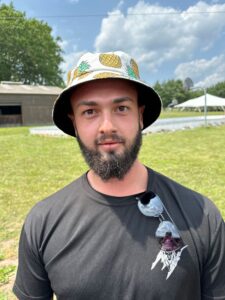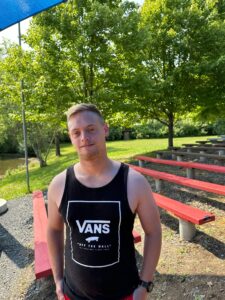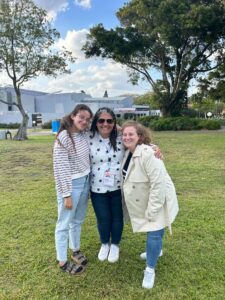From Israel to Kunkletown
Examining the stark transition from IDF to camp staff
By: Avi Holzman
Every summer, usually a week before opening day, around 200-250 staff arrive at camp for their summer to begin. Their shift from being young adults to counselors is critical to the summer’s success and directly impacts each camper’s experience at Harlam.
The transition staff members make to camp is different for each individual counselor; those who grew up at Camp or are returning feel more comfortable switching back into ‘camp mode’ for two months, while staff traveling from outside the United States have a more substantial transition. This is particularly true for a handful of Israeli staff members (Mishlachat) who have just a few days between ending their services in the Israel Defense Forces (IDF) to boarding a flight bound for Kunkletown, PA.
Assistant Director Aaron Soloman oversaw the Staff Transition and supervised the hiring for this summer. Assistant Director Aaron Soloman supervises Camp Harlam’s Staff Experience, which includes the counselor hiring process. He explained that Harlam hires the Mishlachat through the Jewish Agency of Israel (JAFI), which provides candidates for Camp to interview.
“This year, I was lucky enough to head over to Israel and do the hiring in person,” Soloman said. He described the “face-to-face opportunity to talk through what it means to come to camp” with each Mishlachat member in Israel.

Tomer Engel, will be a Chavurah Cabin Counselor and Waterfront Speciality counselor this summer.
After one more weekend-long conference in Israel and a few months, they arrive at camp jet-lagged, unsure of what to expect will unfold.
To mitigate the culture shock and give ample time for staff to prepare, Harlam created “International Weekend.” So that all international staff, regardless of their home country or role at camp, could have time to familiarize themselves with their summer home.
Tomer Engel ended service in the IDF’s armored forces on Thursday, June 9th, 2022, and flew to camp on Saturday of the same week. The native of Ma’alot (near the border with Lebanon) returned for a second summer on staff and will be a Chavurah cabin counselor and lifeguard. The first time he drove through the gates, it felt like going to a magical place akin to “Camp Half-Blood,” from the Percy Jackson book series.
He heard about the Jewish Agency and working at an American Sleep-away camp from a friend in the Army. For him, the two-day transition was not a shock because in the military service, his unit “lived on the edge.”
“I never put my phone on silent, and I always had a bag ready to go if they called us to go somewhere,” Engel explained. Living in that unit made him “Used to going and doing something new in some new place [with] new people.”
He overcame the language Barrier and dyslexia to have a successful summer. According to him, his English improved “very fast,” so much so that at one point, he started to get angry at himself because he was thinking in English and not Hebrew.
Iyar Nimtson grew up in Rishon Letzion and served as a combat medic in an infantry unit within the IDF Armored forces. He initially heard about Camp Harlam from his mom, who worked at a Jewish sleepaway camp in the United States when she was younger. Nimtson said that she was the one who “pushed him” to work at camp despite the quick transition following his service.

Iyar Nimtson will be an Adventure Specialty counselor in Arava 6 this summer.
When he arrived at camp Nimtson had, “just a little bit of fear” because he never worked at a summer camp before, but is enjoying spending time with the other Mishlachat members and getting to know his co-counselors in Arava six from England, America, and Australia.
He views building bonds with his co’s as something similar to the friendships created during his service. Relationships between people “who ate together and did everything together,” who now are “best friends” and still talk with one another.
He described himself as the “Kid who can not stop moving” and is working as an adventure specialty counselor this summer. His favorite adventure element so far is the Swing. The first time he went on the swing, he thought, “Soul went out of my body,” but he still “loved” the experience.
The differences between the Israeli culture he grew up surrounded by, and Camp Harlam are things he loves and embraces. Despite never attending a sleep-away camp, Nimtson wants “the campers to have the best summer of their life,” and wants to experience summer camp himself.
Like Nimtson, Shir Yatziv, from Giv’at Shmuel and working as a Sharon Cabin Counselor, was encouraged to work at camp by her family. In 2013 her sister, Tal, worked in Chavurah when Ellie Tepper Schulman, now the current Associate Director, was the unit head.

Shir Yatzir (Left) and her sister Tal (right) with Ellie Tepper-Shulman (Middle) at the JAFI conference earlier this year.
Tal told Shir that working at Harlam was, “the best summer ever,” and insisted that she work there as soon as her army service ended. When Shir arrived at camp, it hit her all at once: “this is the place my sister [was], and it is crazy that she had a good time here and keeps talking about it.”
Each one of these staff members is on their own path towards opening day when campers arrive and their role as counselors kick into high gear. Next summer, another group of Mishlachat will come to camp straight from the IDF and experience something similar.
Engel had three pieces of advice for those who are thinking about working at Camp Harlam.
“Go for it.”
“[It is] one of the best experiences that I ever had.”
“Bring [a lot of] Coffee.”
